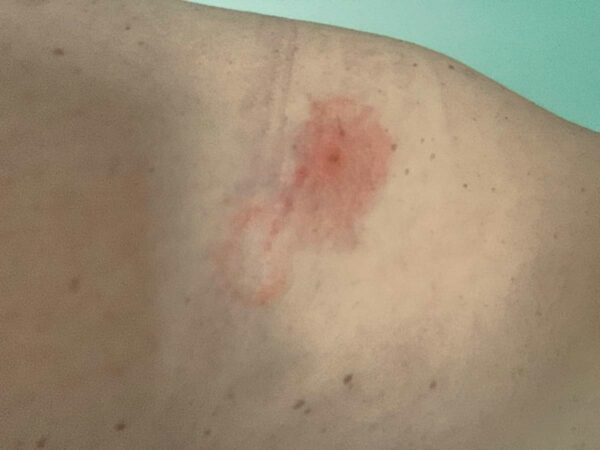
Arlington residents say they are being plagued by mysterious bug bites featuring unusual red splotches that are itchier than those left by typical summer suckers.
A Facebook group, “Arlington Neighbors Helping Each Other Through COVID-19,” has helped community members with similar bites find each other, share information and try to get to the bottom of the mystery. There’s been similar chatter on local email listservs.
“I was so grateful to see that I wasn’t the only one experiencing this issue — and apparently many, many others feel the same way,” resident Becca Collins tells ARLnow.
The Facebook thread started on Sunday, when the original poster asked the group, “Anyone else finding that they’re getting bit by something while outdoors that is leaving a lingering mark?” She added that “this has happened to us multiple times in the last 10 days. The bite seems a lot different from your typical mosquito bite, leaving a red patch around the bite that’s been lasting for over a week (as well as the intense itchiness despite Benadryl, etc).”
The post has since received at least 160 responses and been shared eight times. A respondent said she went to an urgent care clinic “after a sleepless night due to the itching/burning bug bite on my neck, that swelled up into a small patch… It also had red itchy streaks reaching up to my lymph node that became swollen and painful.”
Another reported a similar story.
“Had my daughter at urgent care yesterday,” the poster wrote. “Her two bites look EXACTLY like everyone’s photos here. The doctor at urgent care said they’re seeing a lot of these bug bites.”
Receptionists at three local urgent care centers confirmed they’ve seen an influx in patients with bug bites.
“It is up this summer, more than usual,” said one receptionist for All Care Family Medicine & Urgent Care.
Another for Urgent Care Center of Arlington said “we don’t really know what type of bites they are. Patients come in for a bug bite, but they’re not sure if it’s a tick, mosquito or spider bite.”
Collins said hers was different from a tick bite, which is ringed by a clearly defined red circle. Hers and “many of these welts have ‘trailing red tails’ coming from them,” she said.
The Facebook group members have hatched a theory that these bites are tied to oak itch mites, or pyemotes, which are thought to feed on cicadas eggs. Similar outbreaks of itchy bug bites have coincided with periodic cicada cycles in Chicago and Northern Ohio.
“They are the gift that keeps on giving,” one resident tells ARLnow of the Brood X cicadas that swarmed the D.C. area. The cicadas may also be linked to a wave of dead birds this spring and summer.
These mites feed on insect larvae that inhabit oak trees, according to previous news reports and academic papers. And this year, with thousands upon thousands of eggs laid by cicadas, there was a veritable feast for the mites.
“Until I saw the post, I thought I was getting eaten by spiders in my sleep and was going to take some serious mitigation steps, but if the mite theory is correct, that saves me A LOT of work and worry,” one tipster told ARLnow.
Kurt Larrick, the assistant director of the county’s Department of Human Services, confirmed that residents are reporting these strange bites to the county. But county staff cannot say anything definitive yet about the phenomenon.
“We are tracking reports and consulting with internal and external subject matter experts,” he said. “However, there is no clear cut answer at this point.”
He encouraged residents to take preventative measures for mosquitoes and ticks, which he said are effective for other “nuisance and disease-carrying bugs” as well:
- Use an effective repellent, such as DEET, Picaridin or Oil of Lemon Eucalyptus
- Ensure door and window screens are intact
- Be more vigilant at dawn and dusk when mosquitoes are most active
- Wear long sleeves, pants and socks while outdoors when possible
- Drain all sources of standing water to prevent mosquitoes from breeding
Ticks spread diseases like Lyme disease, Rocky Mountain spotted fever and ehrlichiosis, Larrick noted. In addition to dressing appropriately and using insect repellants registered by the Environmental Protection Agency, he recommended that residents avoid possible tick habitats, do regular tick checks, and talk to veterinarians about tick control for pets.
As for those with strange bites, Larrick recommended seeking the advice of a medical professional, even though they may be busy with patients reporting other itchy bumps.
“If, despite prevention, you are bitten and have concerns, we encourage you to see your healthcare provider,” he said.

